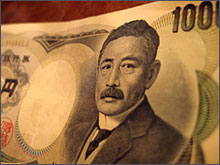Having attracted multinational giants such as Volkswagen and McDonald's, yuan-denominated bonds or dim sum bonds are now finding favour with Indian companies as domestic funds become expensive. Apart from the cheaper interest cost, the need to make local purchases and payments in the yuan has prompted a few Indian companies with Chinese operations to explore fund-raising opportunities through this route, bankers say.
Apart from the cheaper interest cost, the need to make local purchases and payments in the yuan has prompted a few Indian companies with Chinese operations to explore fund-raising opportunities through this route, bankers say.
"It has not become widespread, but some companies have expressed interest. If you have receivables in the yuan, it makes sense to raise a liability in that currency," says a senior official with the international business division of a Mumbai-based state-run bank.
While banks and companies are not willing to offer details on the likely Indian issuers of dim sum bonds, media reports suggest Infrastructure Leasing & Financial Services (IL&FS) could be one of the first domestic companies to raise funds through the sale of renminbi-denominated bonds.
Industry sources say the Reliance Anil Dhirubhai Ambani Group has also evinced interest in a similar issue for one of its group companies. Business Standard could not independently verify these plans.
"Many Indian companies are now looking to have a portion of their revenue from China, Hong Kong and other emerging markets in this region. They feel they need to broaden their investor base. They need to take liabilities in those currencies and establish their brand names there," says a senior official in charge of the global markets business of a foreign bank.
"Right now, people prefer to keep their powder dry in the Indian market as the rates have gone up sharply. If the renminbi bond market provides an opportunity to raise money at a lower cost, it makes sense to explore that opportunity. These markets will not remain favourable eternally," says the official.
Bankers say companies can raise money at a 1-3 per cent coupon rate by issuing dim sum bonds of maturity three to five years.
A similar issue in India could cost firms an interest rate of 9-10 per cent. Rates in India have hardened as the Reserve Bank of India (RBI) has increased the policy rate 11 times in the last 16 months in a move to tackle rising prices.
Dim sum bonds are gaining acceptance globally, as well. In the first six months of this calendar year, dim sum bond issuances by companies across the globe are estimated to be around $13 billion or nearly double the amount raised in the whole of last year through similar issuances, bankers say. In 2010, companies raised about $6.6 billion through renminbi-denominated bonds.
Hongkong and Shanghai Banking Corporation (HSBC) was the leading issuer of off-shore renminbi bonds and was the joint lead arranger for Hong Kong's first renminbi-denominated initial public offer.
"Our expertise in renminbi complements our leadership in global trade," says Peter Wong, chief executive of HSBC Asia-Pacific.
Earlier this month, China's finance ministry unveiled a plan to raise 20 billion yuans in a sale of dim sum bonds of multiple tenures. The deal is more than double the size of its previous offering, and the move is seen as Beijing's intention to promote yuan use internationally.
"Chinese authorities are trying to internationalise the yuan by encouraging trade invoicing in that currency. Yuan receivables create liquidity for the issuance of dim sum bonds in Hong Kong," says Samiran Chakraborty, regional head of research, India, Standard Chartered Bank.







 © 2025
© 2025